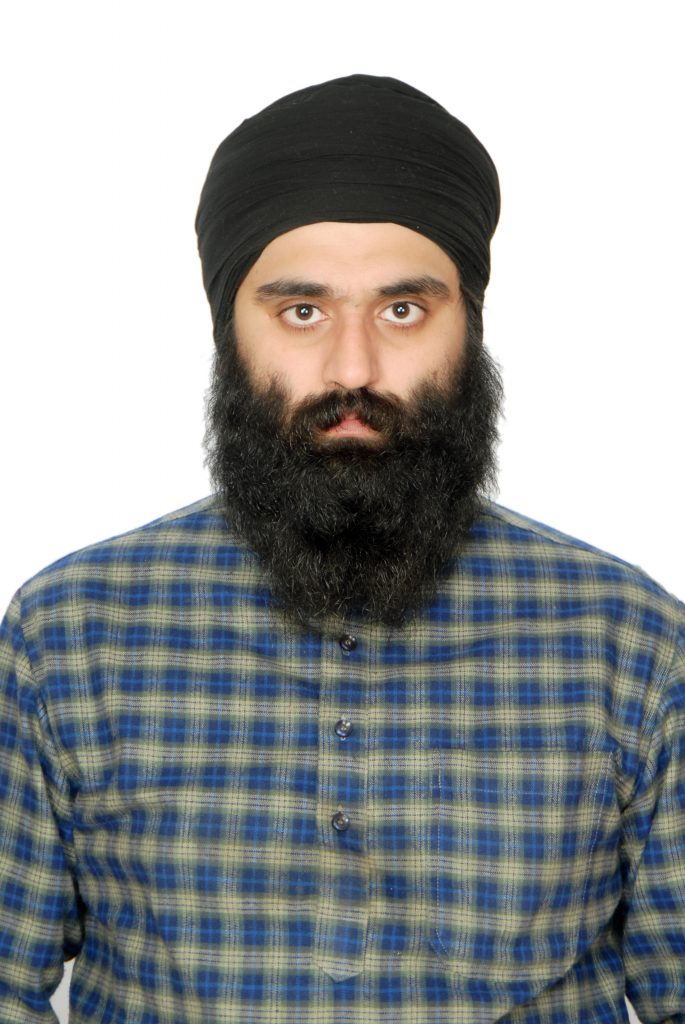Rajbir Singh Judge is a PhD candidate at the University of California, Davis. He currently lives in Patiala, Punjab, and has been a member since 2013.
Website: http://ucdavis.academia.edu/RajbirJudge
Twitter: @sikhhistorian
Alma maters: BA, California State University, Chico, 2010; MA, University of California, Davis, 2012; PhD, University of California, Davis, expected July 2018
Fields of interest: South Asian, Middle Eastern, and European intellectual history
Describe your career path. What led you to where you are today? I grew up in a Sikh migrant farmworker family in low-income housing, in which a four-year college, let alone graduate school, seemed outside the horizons of my possibilities. However, watching my parents, Rai Singh Judge and Surinder Kaur Judge, work in brutal conditions without losing their optimism for my future inspired me to do well in my studies. Advisors in higher education pipeline organizations, such as Diana Parra-Villaseñor at Educational Talent Search, helped me apply to, and eventually attend, California State University, Chico. At Chico State, I completed my BA in three majors (History, Religious Studies, and Philosophy) while also working in a fruit-packing cannery during the summers. The faculty at Chico were tremendous—Edward Pluth’s teaching was especially inspirational as he helped me navigate Marx’s relevance not only historically, but to my own laboring present. As I neared graduation, I knew I wanted to continue to pursue my education even though the graduate school application process was incredibly alien to a first-generation college student. Still, I wanted to research how peoples historically negotiated the violent attempts to regulate and govern their bodies and ideas, which, nonetheless, remained unable to be demarcated neatly. Luckily, I found a home at the University of California, Davis, where Omnia El Shakry’s guidance alongside her enthusiasm for my work have helped me survive the psychical and physical stresses of graduate student life. Prof. Jagdish Singh at Naad Pargaas alongside Dr. Jaswinder Singh at Punjabi University, Patiala have extended this thoughtfulness globally, providing innumerable support and care in Punjab. In short, I am here today because multiple people have been terribly generous and kind.
What do you like the most about where you live and work? Though life in graduate school is precarious at best, I have enjoyed travelling with my family and meeting fantastic scholars and activists globally.
What projects are you currently working on? I am currently completing my dissertation! My dissertation explores the various imaginings Duleep Singh, the deposed Maharaja of Punjab, occupied in his transnational intrigue against British rule at the end of the 19th century. I investigate how Singh’s attempt to foster revolution cannot be reduced to his transnational alliances and failed maneuverings alone. Rather, my dissertation argues that Singh was as an enchanted symbol of contestation for Sikhs, Hindus, Muslims, and Theosophists, functioning as a common frame of reference as the traditions engaged in inter- and intra-theological debate, cross-border movement, bodily discipline, literary production, and the cultivation of ethical practice. Generative of multiple questions and positions, I argue Singh kept sovereignty, alongside social and political change, open to continuous argumentation and experimentation. Thus, my dissertation foregrounds the productive, though often discordant and antagonistic, capacities of tradition, continuously offering hope for a world burdened by the regulatory and physical power of the colonial state.
Have your interests evolved since graduation? If so, how? After I complete my dissertation, I plan on pursuing a second book project that examines the ambiguous nature of sexual relationships between South Asian men and Europeans globally during the fin de siècle.
Is there an article, book, movie, blog etc. that you could recommend to fellow AHA members? I recently read two books that I found quite brilliant: Noah Salomon’s For Love of the Prophet: An Ethnography of Sudan’s Islamic State and Michael Allan’s In the Shadow of World Literature: Sites of Reading in Colonial Egypt.
What do you value most about the history discipline? History provides us an apposite opportunity to consider what Slavoj Žižek terms “the ontological openness of the historical process” in which we can, hopefully, “reintroduce the openness of the future into the past.”
Why is membership in the AHA important to you? As we are compelled to be ever more disciplined, professionalized, and productive, the AHA also forces us to contend with the collaborative and unruly nature of ideas, which unsettles our collective certainties while cultivating a lost, but profoundly necessary, anxiety in our present impasse.
AHA members are involved in all fields of history, with wide-ranging specializations, interests, and areas of employment. To recognize our talented and eclectic membership, AHA Today features a regular AHA Member Spotlight series.
This post first appeared on AHA Today.
Tags: AHA Today Member Spotlight Asia/Pacific
Comment
Please read our commenting and letters policy before submitting.






